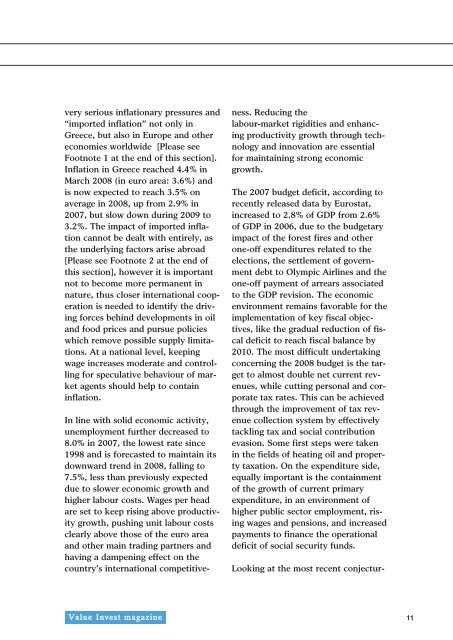VALUE INVEST - Valuation & Research Specialists
VALUE INVEST - Valuation & Research Specialists
VALUE INVEST - Valuation & Research Specialists
Create successful ePaper yourself
Turn your PDF publications into a flip-book with our unique Google optimized e-Paper software.
very serious inflationary pressures and<br />
“imported inflation” not only in<br />
Greece, but also in Europe and other<br />
economies worldwide [Please see<br />
Footnote 1 at the end of this section].<br />
Inflation in Greece reached 4.4% in<br />
March 2008 (in euro area: 3.6%) and<br />
is now expected to reach 3.5% on<br />
average in 2008, up from 2.9% in<br />
2007, but slow down during 2009 to<br />
3.2%. The impact of imported inflation<br />
cannot be dealt with entirely, as<br />
the underlying factors arise abroad<br />
[Please see Footnote 2 at the end of<br />
this section], however it is important<br />
not to become more permanent in<br />
nature, thus closer international cooperation<br />
is needed to identify the driving<br />
forces behind developments in oil<br />
and food prices and pursue policies<br />
which remove possible supply limitations.<br />
At a national level, keeping<br />
wage increases moderate and controlling<br />
for speculative behaviour of market<br />
agents should help to contain<br />
inflation.<br />
In line with solid economic activity,<br />
unemployment further decreased to<br />
8.0% in 2007, the lowest rate since<br />
1998 and is forecasted to maintain its<br />
downward trend in 2008, falling to<br />
7.5%, less than previously expected<br />
due to slower economic growth and<br />
higher labour costs. Wages per head<br />
are set to keep rising above productivity<br />
growth, pushing unit labour costs<br />
clearly above those of the euro area<br />
and other main trading partners and<br />
having a dampening effect on the<br />
country’s international competitive-<br />
Value Invest magazine<br />
ness. Reducing the<br />
labour-market rigidities and enhancing<br />
productivity growth through technology<br />
and innovation are essential<br />
for maintaining strong economic<br />
growth.<br />
The 2007 budget deficit, according to<br />
recently released data by Eurostat,<br />
increased to 2.8% of GDP from 2.6%<br />
of GDP in 2006, due to the budgetary<br />
impact of the forest fires and other<br />
one-off expenditures related to the<br />
elections, the settlement of government<br />
debt to Olympic Airlines and the<br />
one-off payment of arrears associated<br />
to the GDP revision. The economic<br />
environment remains favorable for the<br />
implementation of key fiscal objectives,<br />
like the gradual reduction of fiscal<br />
deficit to reach fiscal balance by<br />
2010. The most difficult undertaking<br />
concerning the 2008 budget is the target<br />
to almost double net current revenues,<br />
while cutting personal and corporate<br />
tax rates. This can be achieved<br />
through the improvement of tax revenue<br />
collection system by effectively<br />
tackling tax and social contribution<br />
evasion. Some first steps were taken<br />
in the fields of heating oil and property<br />
taxation. On the expenditure side,<br />
equally important is the containment<br />
of the growth of current primary<br />
expenditure, in an environment of<br />
higher public sector employment, rising<br />
wages and pensions, and increased<br />
payments to finance the operational<br />
deficit of social security funds.<br />
Looking at the most recent conjectur-<br />
11


